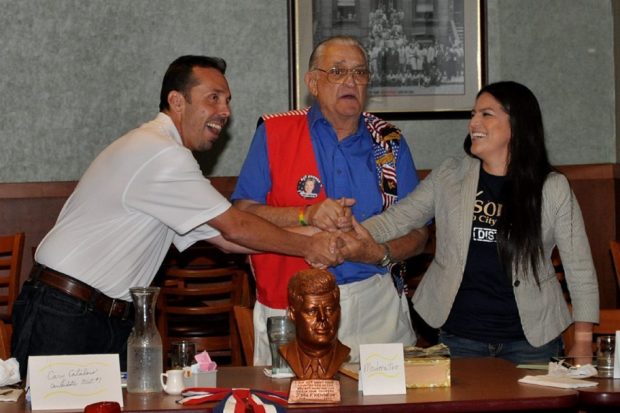
By Mike Rhodes
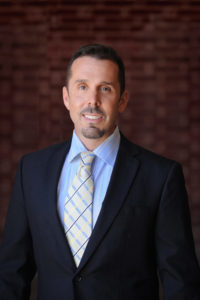
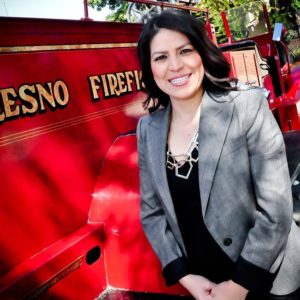
The battle is on for the Fresno City Council District 1 seat, and both candidates want the vote of Community Alliance newspaper readers. Both claim to be the true progressive in the race and whoever wins will make history. Cary Catalano would be the first openly gay candidate elected in Fresno, and Esmeralda Soria would be the first woman ever elected in District 1.
Catalano and Soria were the featured speakers in September at a meeting or the Kennedy Club of the San Joaquin Valley, a liberal group affiliated with the Democratic Party. The first thing I saw upon arrival was the club’s literature table with a brochure of Catalano and “Three Strikes and You’re Out” author Mike Reynolds. One could see this as a bold move by the Catalano campaign to show his appeal across the political spectrum, but others will view the “lock ’em up and throw away the key” message as out of sync with a progressive agenda.
Catalano’s opening remarks addressed his support for Measure G, Mayor Ashley Swearengin’s 2013 attempt to privatize sanitation workers’ jobs. Organized labor and progressive groups built a powerful coalition in opposition to Measure G. The initiative failed and is broadly viewed as a strong indicator of a candidate’s support for unions, organized labor and the right for workers to earn a living wage. Sixty-eight percent of District 1 voters opposed Measure G in the June 2013 election.
Boldly and confidently addressing Kennedy Club members, Catalano said he supported outsourcing sanitation workers’ jobs last year “because I was absolutely concerned about the insolvency of the city and the services that we were providing to our residents.” He said he was a lifelong Democrat and “not about destroying the middle class. I help the middle class every day. I employee people, I help people create jobs, I help the working poor by raising money for nonprofits so they can afford homes, have food, go back to school and get a GED.”
Not surprisingly, Soria disagrees with Catalano on the outsourcing issue. Pointing out that she voted with the majority of District 1 residents on this issue, she said, “I was the candidate that stood with the people of District 1.”
Soria does not accept the pro–Measure G argument that the city was on the verge of financial collapse or that this was about improving the efficiency of the sanitation department. “We had a department that was working really well. It is nationally recognized, actually making revenue,” Soria said.
Speaking about the sanitation workers’ jobs that were at risk, Soria said, “These are good-paying jobs, and we know we live in a city where our medium household income in many neighborhoods is way below the state’s average. There is a poverty that plagues our community, and a lot of the problems we face in our neighborhoods stem from that.” Soria supports jobs that pay a living wage in this community and is opposed to the privatization of core public services.
During the Measure G campaign, supporters said that if it did not pass we would have to lay off police and firefighters, and some right-wing pundits suggested that Fresno would go into bankruptcy. Soria noted that not only did we not go into bankruptcy, but “actually, we saw additional revenues come in” and the financial picture has improved.
The Measure G issue was a demarcation line for organized labor as they selected candidates to support in this year’s local elections. Dillon Savory, the political director of the Fresno Madera, Tulare, Kings Central Labor Council (CLC), told me that “the Central Labor Council is proudly supporting Esmeralda Soria. She has firsthand experience in solving issues for working people and fighting for quality jobs in our community. District 1 deserves a fresh voice. We believe Esmeralda will break the status quo at City Hall.”
Stan Santos is an officer of Communication Workers of America (CWA) Local 9408 and a member of the Executive Board of the Central Labor Council. The CWA represents 20,000 union members residing in the Fresno area. Santos says that “the CLC has not forgotten Catalano’s support for the attempt to privatize garbage collection through Measure G. This was an outright attack on city employees and provides insight into how Catalano might vote on similar issues.
“Soria has committed to consulting with the labor community and residents of District 1 before imposing such drastic measures. Also, the list of endorsements for Catalano reads like a ‘Who’s Who’ of big money in Fresno, including Mayor Swearengin, Chambers of Commerce officials, developers and real estate associations. After frank discussion, CWA Local 9408 decided to support Soria in her bid for the Fresno City Council.”

Susan Good, business owner and Democratic activist (a 25-year member of the Executive Board of the California Democratic Party), says that “supporters of organized labor should look at Cary Catalano as a friend. Cases in point: his campaign treasurer is Dave Wilson, my husband, who is a UFCW [United Food and Commercial Workers] retiree and who currently sits on the Central Labor Council Executive Board. Dave and I have seen Cary disagree with organized labor on only one issue—Measure G in 2013.
“Additionally, in 2010–11, he worked with UFCW to fight against Walmart and when he ran for elected office in 2002, he had the Central Labor Council endorsement. I know Cary will be accessible and willing to meet with labor groups; he already knows the vast majority of them.”
It is no secret that Catalano is supported by Republican Mayor Ashley Swearengin and that Soria is supported by Henry R. Perea on the Fresno County Board of Supervisors and State Assembly Member Henry T. Perea. A number of people see the District 1 City Council race as a proxy contest between the Pereas and Swearengin. A Catalano victory would give the mayor a five-vote super majority on the City Council.
I asked Catalano if there were any major local policy issues that he disagreed with the mayor on. He spoke for a long time about Measure G, and I thought he had misunderstood the question. But in fact, he was getting to his point. “I disagreed with the fact that we did not have multiple haulers to provide the service.” Catalano was talking about the decision to privatize sanitation workers jobs and give the contract to one company—Mid Valley Disposal. He said, “I think there should have been more than one hauler. It would have allowed for excellence in the delivery of service and the lowest possible price. That is where I did disagree. I never did understand why it was just one hauler.”
I asked if there were any other issues or policies that he disagreed with the mayor on. Catalano said, “No, but there were always bits and pieces of every little thing.” Catalano went on to say that he would like to see the response to the needs of the homeless move faster.
Soria said she could not think of any major local policy issue that she disagreed with the Pereas on, but then added that perhaps her definition of infill might be more restrictive. There is a battle going on in local government trying to limit infill (building new homes and apartments in existing spaces near the city core, rather than new developments leapfrogging into agricultural land). Many builders and developers have an expansive view of infill (anywhere in the city limits) and community activists want to refocus and restrict the largely unregulated growth of the past. This is being worked out in the 2025 General Plan at City Hall that will guide future development in Fresno.
Both candidates want to help the homeless and think that not enough is being done. Catalano works with Fresno First Steps Home (FFSH), which is a nonprofit set up by the mayor to work on the city’s Housing First approach to ending homelessness. Catalano and his company, Catalano Fenske and Associates, LLC, has been the paid fund-raiser for FFSH since 2012. The nonprofit paid Catalano’s company $47,463 in 2012. Records for 2013 are not yet available.
FFSH is the City of Fresno flagship project to help the homeless, and it is strongly supported by Catalano. The nonprofit gave no money to the help the homeless in its first two years of existence (2010 and 2011). Yet, in October 2011 City Hall and FFSH sent out a press release announcing a $250,000 grant to the Fresno Housing Authority, but evidence of that contribution is not included in the IRS reports they filed for that year. While homeless people in downtown Fresno were dying on the streets, FFSH sat on more than $500,000 while publicly claiming to give assistance to the homeless.
Catalano’s response was that groups receiving money from FFSH don’t “get all of the money all at once. It is done in disbursements, based on benchmarks; they have to submit receipts and reports before they get reimbursements.” Apparently, that is a long process because FFSH did not report in the 2012 IRS report that it contributed $250,000 to homeless projects that year either. It did, however, report paying Catalano’s firm $47,463 for fund-raising efforts.
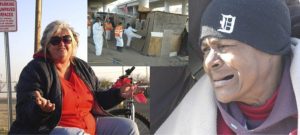
Soria is not an expert on homeless issues and says that cooperation with the county and learning best practices from other cities is the direction she would go. She is not sure that current city policy is working and says that “what we have done over the last couple of years, with the cleanup of the encampments, I don’t know if that has really helped anything. It has irritated some people, because they see the transient population move (to different parts of the city).
“Housing is important, but it is not the sole solution to the homelessness issue because it is much more complex. People have some mental health issues, and if we don’t get them help, it is going to continue to happen,” Soria said.
“We need to do a better job, not only on the homelessness issue, but on a broader scale of issues. Work better with the county. We have no really existing relationship and there is so much overlap and partnership that can happen.”
On the issue of police accountability, an important area of concern for the progressive community, Catalano does not hesitate for a minute to say what he would like to do with the Office of Independent Review (OIR). Catalano said that “what we have is just a waste of taxpayer money. The many people that fought for the independent police auditor wanted so much more and I think they were happy just to get something and that is great. I personally feel it is a waste of taxpayer money. In fact, I will probably work with the groups and let them know that I’m not interested in spending another dime in what I consider to be no real oversight. This is not what many in the community want.”
That does not mean that Catalano wants the OIR to go away and never come back. He said, “What I need to do is ask the Council to put together a Council committee with residents that support the OIR to see what we need to do to strengthen it, to make it more effective. Are there modifications to the existing program, what are your agitations, what are your concerns, where do you think we failed? I also want to ask where we are being successful.”
Almost all progressives believe that the OIR, which has no investigative powers, is a captive of the bureaucracy at City Hall, has not measurably improved police accountability and needs to change. Most people want to improve the OIR while a few want it to be dissolved to eliminate the illusion of having police accountability, without the reality.
Soria said that “at some point, what we have to think about is, if this is the best use of our money. Maybe if that is not working, create something that will work. Also, we need to do a better job of building the trust between the community and the police.” Soria is supported by the powerful Fresno Police Officers Association, which has largely opposed strengthening the OIR.
Neither of the candidates said they would try to change the City of Fresno ordinance that prevents medical marijuana dispensaries in the city limits. Both diplomatically said they were open to talking to residents about the issue, but don’t expect either of them to provide leadership to bring back medical marijuana dispensaries. While not proponents of easing the restrictions on medical marijuana, they probably won’t jump on City Council member Lee Brand’s bandwagon to specifically make it illegal to smoke pot in public either.
There are some, but not a lot, differences of opinion in the progressive community about who to vote for in the Nov. 4 Fresno City Council District 1 race. Among Catalano’s biggest endorsements that will be familiar to Community Alliance readers are Patience Milrod and her husband Paul Pierce. They write, “Before we made our endorsement decision, we sat down and met with Soria and with Catalano. (Community Alliance readers can imagine how refreshing we found the idea of a Latina lawyer on the Fresno City Council!) However—we are also acutely aware that to make meaningful change, a Fresno City Councilmember needs more than intelligence and progressive values.
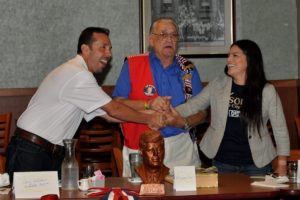
“He or she needs policymaking experience—not politicking a boss’ legislative agenda, but actually being the idea-generator—and then doing the hard work to make those ideas, those policy solutions, realities. People who invest time and energy in our city this way earn crucial working relationships with folks across the political spectrum. A Fresno City Councilmember who hopes to accomplish anything at all must have those cross-spectrum relationships and the skill to build consensus in a contentious environment.
“While both Soria and Catalano are intelligent and progressive, we support Catalano in this race because he’s the one who will be most effective, and immediately—who has years of experience in the city and the district, a track record of successful policy initiatives, a wide and deep network of relationships here, and the consensus-building skills to bridge political barriers.”
Michael D. Evans, chair of the Fresno County Democratic Party, said, “I support Esmeralda Soria for Fresno City Council District 1 because we need the diversity on the Council that her presence would bring. She would be the only female member of the Council and just the second Latino member on the Council. Through her community and legislative work, she has represented underserved communities, has a vast knowledge of the issues facing our community and she upholds Democratic values.”
Howard Watkins, past chair of the Central Valley Progressive PAC, said, “I am supporting Esmeralda Soria because she is the better candidate to represent the people of District 1 and the City of Fresno. This was clearly shown by her strong opposition to Measure G and the city’s wasted effort to privatize our award-winning, residential trash pickup. Also, our city would benefit by having a highly qualified woman serving on the City Council again.”
Gail Gaston is a well-known Democratic activist who supported Catalano in his first run for the City Council District 3 seat in 2002. Catalano came in fifth with 11% of the vote in that election, which was won by Cynthia Sterling. In this year’s June primary election, Catalano was the No. 1 vote getter, receiving 30 more votes than Soria. Gaston, who is now supporting Soria, said, “I believe Esmeralda has the great qualities of knowledge and educational background to work at City Hall, and she has the compassion and concern to work with the residents of District 1.”
Ellie Bluestein, known and loved by progressives near and far, said, “I am supporting Soria because I’m angry that there have been no women on the City Council for years, and I bemoan that fact and feel women as candidates have to be encouraged in every way. I don’t think either of them [will be] an independent voice on [the] Fresno City Council, which would support workers’ interests and an honest police department.
“Perhaps Soria would be stronger on a fair immigration policy. I would certainly hope so. Cary seems to have no clear principles. He’ll go with whoever or whatever to advance himself. He is unscrupulous. His campaign behavior was desperate and dishonest.
“You know I supported Rebeca Rangel (a candidate for District 1 in the primary election) because she supports all the things I do—fairness for the working class, an end to racism in all aspects of city government and treatment of our citizens, she is bright and if she does not understand what’s going on she’ll search it out and get to the bottom of it and is not afraid to challenge people or groups and hold their feet to the fire. I don’t see either of the two candidates meeting those criteria.
“I don’t look forward to the actions of the next City Council. I know some people feel it’s important to support someone who will win. But if that person just maintains the status quo, what have we won?”
Former Fresno County Supervisor Susan Anderson is supporting Catalano. In a statement announcing her support, she wrote, “Fresno’s future has always been my top priority—and electing highly qualified leaders to the Fresno City Council is essential to moving our City forward.
“Cary Catalano is that leader in District 1—a problem solver who’s smart, passionate about making Fresno better, skilled at bringing others to the table, and courageous enough to take unpopular positions. Fresno deserves tough, effective leaders like Cary. I strongly support Cary Catalano as District 1’s next City Council member—please join me!” Anderson, who is well liked in the progressive community, was on the No on Measure G committee and even debated Mayor Swearengin on TV about the issue.
Loretta Kensinger, who is a faculty member at Fresno State, is supporting Soria because “there needs to be diversity on the City Council. We need a woman’s perspective.” Kensinger, who lives in District 1, says she believes Soria understands the importance of good jobs in this community and will not privatize the public sector.
The Fresno Stonewall Democrats describe themselves as working through the Democratic Party to advance the rights of all people, regardless of sexual orientation or gender identity. Fresno’s gay Democratic club recently announced its support not for the openly gay candidate but rather for Soria.
Catalano has a wide range of support in the community, including the Fresno Bee, Steve Brandau, Lee Brand, Clint Olivier, Craig Scharton, Margaret Mims, Mike Reynolds, Michael Der Manouel Jr,, Leonel Alvarado and the Fresno Chamber of Commerce.
Soria’s endorsers include Sarah Reyes, Juan Arambula, Victor Salazar, Dan Ronquillo, Eric Payne, Isabel Barreras, Luis Chavez, Cal Johnson and the Central Valley Progressive PAC.
The voters in District 1 have a historic choice to make—they will either elect the first woman Council member from District 1 and the only woman on the current City Council or the first openly gay candidate. Which one is the real progressive is not hard to figure out.
*****
Mike Rhodes is a frequent contributor to the Community Alliance newspaper. Contact him at mikerhodes@comcast.net.
